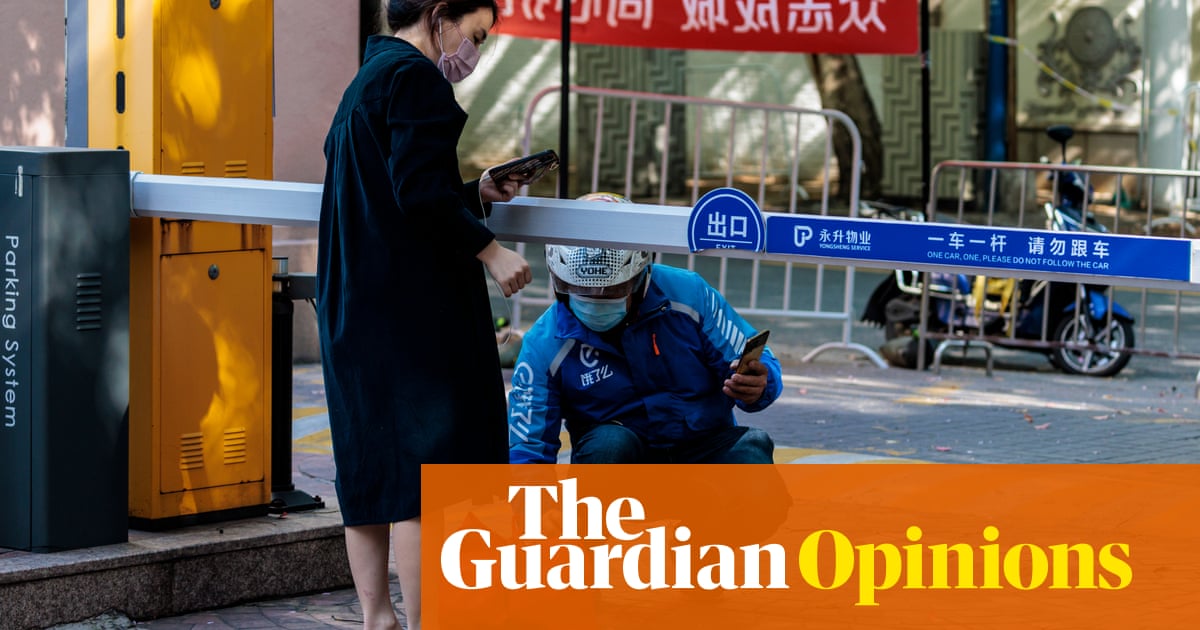The Guardian view on China’s zero-Covid strategy: no way out?
Show caption A woman in quarantine receives a food delivery in Shanghai: ‘For obvious reasons it is very hard to gauge public opinion.’ Photograph: Alex Plavevski/EPA Opinion The Guardian view on China’s zero-Covid strategy: no way out? Editorial The human costs of lockdown in Shanghai have sparked frustration and despair. But leaders have no exit strategy Wed 20 Apr 2022 18.39 BST Share on Facebook
Share on Twitter
Share via Email
Even by the standards of China’s overzealous censors, suppressing a hashtag that simply quoted its national anthem was striking stuff. The opening line – “Arise, ye who refuse to be slaves!” – had been deployed to express the growing anger and distress in Shanghai as what was supposed to be a short, sharp lockdown stretched on for weeks, with gruelling results for individuals as well as damaging effects on the economy. On Wednesday the city eased restrictions somewhat, with millions allowed to leave home for the first time in weeks. Yet even if the worst proves to be over in the financial centre, experiencing China’s biggest outbreak since the virus first emerged in Wuhan, concerns about the country’s insistence on a zero-Covid strategy will persist.
Outside China, the attention has been on the draconian nature of restrictions, with reports of the separation of small children from their parents, people dying from other medical problems because they could not access help, and the beating to death of a dog whose owner had apparently been sent to a quarantine centre. Plenty in China have lambasted the inhumanity, but it is also the inefficiency of authorities which has shocked. An international, sophisticated metropolis is asking why officials insisted there would be no lockdown until the last minute, leaving residents no time to prepare; why the testing and isolation process appears beset by confusion; why conditions are so poor in crowded quarantine centres; and why food is in such short supply. Officials have admitted “difficulties”. Delivery remains at the centre of the party’s legitimacy, even if nationalism has become an increasingly potent force.
Many citizens looked at the huge death tolls elsewhere and concluded that zero-Covid was the right course. China was the first major economy to reopen and grow; much of the country has gone about its business as usual since last spring. For obvious reasons it is very hard to gauge public opinion – still less what that opinion might be without the omnipresent censorship and propaganda. But Edelman research suggests that trust levels in the central government in early 2022 were the highest in a decade.
Shanghai’s experiences have cracked the glossy surface of authoritarian competence. To let the virus loose now, with low vaccination rates among older people, and reliance on the less effective domestically produced vaccine, would be likely to result in significant disruption and death. Because China’s death toll is so extraordinarily low – due in part to the manner of reporting – many people see less reason to be vaccinated, but also less reason to be locked down. At least some residents are asking whether, thanks to vaccines, there is a wiser middle path between letting the virus rip and attempting elimination, which seems increasingly futile thanks to the highly transmissible Omicron variant. But Xi Jinping’s personal endorsement of zero Covid, and the expectation that he will break precedent by claiming a third term as China’s leader at this year’s party congress, makes a change of course look extraordinarily unlikely before then. Stability is all.
Shanghai’s struggle is not an existential issue for the party. It has survived far worse. But about 45 cities – many large, but less well-known and well-connected – are under some form of lockdown. Each one is likely to erode a little further the confidence of citizens. The zero-Covid strategy comes at a cost for the leadership as well as those it rules.













